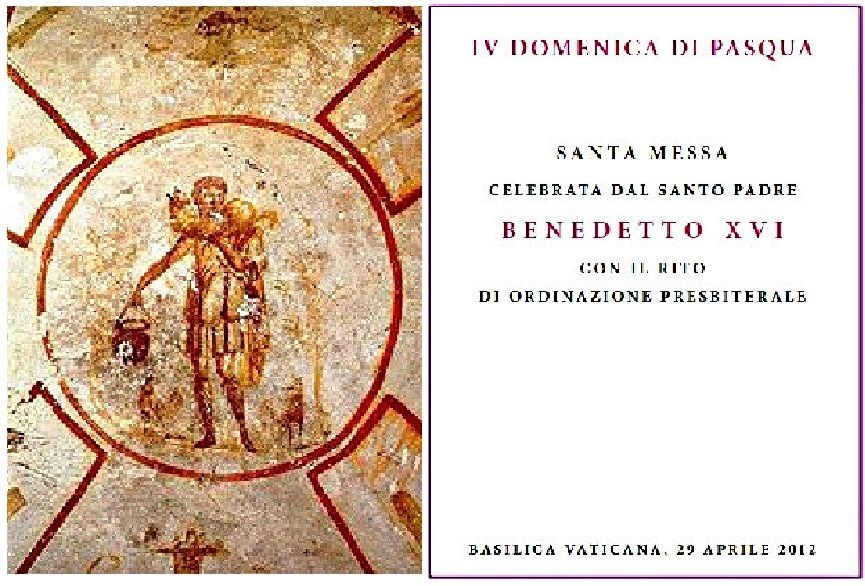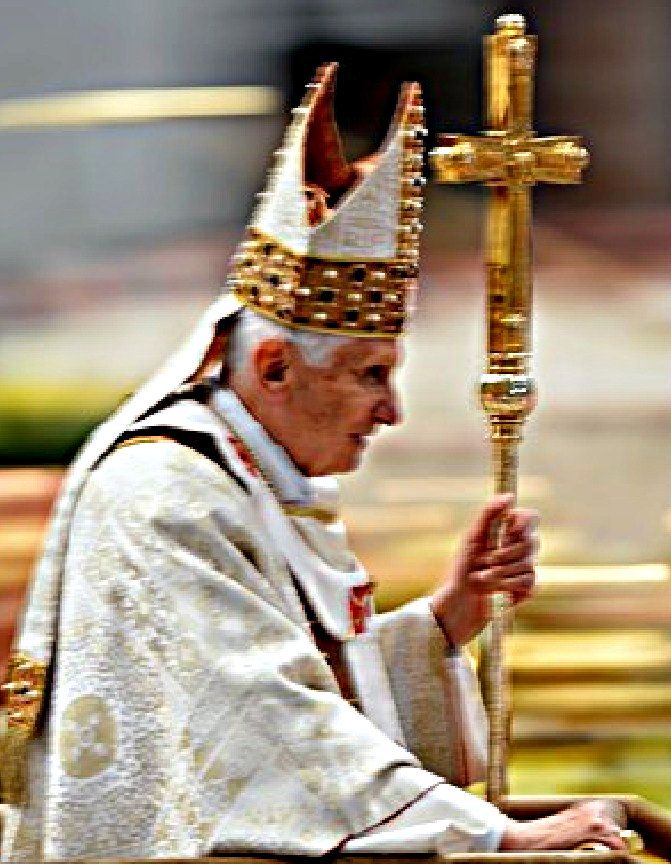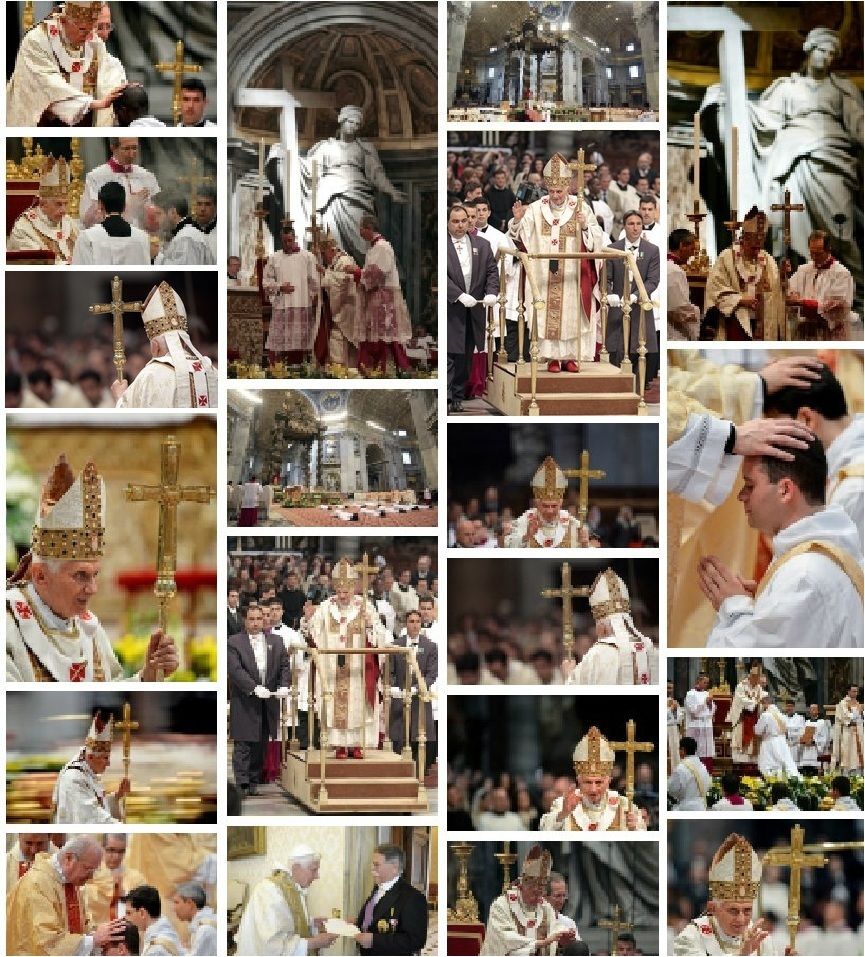| | | OFFLINE | | Post: 24.743
Post: 7.271 | Registrato il: 28/08/2005
Registrato il: 20/01/2009 | Administratore | Utente Master | |
|

 MASS ON THE FOURTH SUNDAY OF EASTER
MASS ON THE FOURTH SUNDAY OF EASTER
Ordination of 9 Priests, Diocese of Rome
 Libretto cover: Christ the Good Shepherd, mid-3rd-cent fresco, ceiling of the Good Shepherd cubicle, Catacomb of San Callisto, Rome.
Libretto cover: Christ the Good Shepherd, mid-3rd-cent fresco, ceiling of the Good Shepherd cubicle, Catacomb of San Callisto, Rome.
At 9 o.clock this morning, The Holy Father presided at Holy Mass during which he conferred Holy Orders on 9 deacons who were educated in Rome's diocesan seminaries.
Eight of them will serve as priests in the Diocese of Rome, while the ninth, who was educated at the Almo Collegio Capranico, will serve the diocese of Bui Chu in Vietnam.
Concelebrating with the Pope were Cardinal Agostino Vallini, His Holines's Vicaf General for Rome; his Vice Regent, Mons. Filippo Iannone; the auxiliary bishops of Rome; the superiors of the three seminaries (Pontificio Seminario Romano Maggiore, Almo Collegio Capranica and Collegio Diocesano Redemptoris Mater), and the parish priests of the ordinands.
 Pope to new priests:
Pope to new priests:
'God's presence more intense
the heavier the cross
that the priest must bear'

April 28, 2012
It was a day to remember for nine deacons who were ordained on this World Day of Prayer for Religious Vocations by Pope Benedict XVI in St Peter’s Basilica.
Eight of the deacons were from the diocese of Rome, one a former pilot, another a chemistry graduate. Also ordained on Sunday was a deacon from Vietnam who had previously been a lawyer.
Speaking to the congregation which included the family and friends of the new priests, the Holy Father said that the priest, like the shepherd, is called to lead the faithful entrusted to him to true life, “a life in abundance”
The Pope told the new priests that the value of their priestly life was not just about social works, it was also about living a life in the vital presence of God - a presence made "all the more intense when the weight of the priest’s cross in life is heavier".
Referring to Sunday’s readings, Pope Benedict also noted, during his Homily, that Jesus had "the experience of being rejected by the leaders of his people, yet helped by God he founded a new church".
The priest, said the Pope, is called to live the experience Jesus lived, to give himself fully to his work as preacher and healer.

Here is a translation of the Holy Father's homily:
Venerated Brothers,
Dear Prdinands,
Dear brothers and sisters:
The Roman tradition of cedlebrating priestly ordinations on the fourth Sunday of Easter, the Sunday of the Good Shepherd, contains a great wealth of significance, linked to the con vergence of the Word of God, the liturgical rite, and the Paschal season in which it occurs.
In particular, the figure of the shepherd, so relevant in Sacred Scripture and naturally, very important for the definition of a priest, acquires its full truth and clarity in the face of Christ, in the light of the mystery of his death and resurrection.
You too, dear ordinands, can always draw from this richness every day of your life, thus continuallky renewing your priesthood.
This year, the Gospel is the central part of Chapter 10 in the Gospel of St. John, and begins with Jesus;s affirmation: "I am the good shepherd. A good shepherd lays down his life for the sheep" (Jn 10,11).
Here we are immediately led to the center, to the summit of the revelation of God as the shepherd of his people. This center and summit is Jesus, he who died on the Cross and resurrects from the sepulchre on the third day, who rises again with all his humanity, and in this way, he involves us, every man, in his passage from death to life.
This event - Christ's Passover - in which the pastoral work of God is realized fully and definitively, is a sacrificial event: that is why the Good Shepherd and the Supreme High Priest coincide in teh person of Jesus who gave his life for us.
But let us briefly looo even at the first Readings and the responsorial psalm (Ps 118). The passage from the Acts of the Apostles (4,6-12) presents us with the testimony of St. Peter to the leaders of the people and the elders of Jerusalem after the miraculous healing of the cripple.
Peter states with great frankness that Jesus "is the stone rejected by you, the builders, which has become the cornerstone. There is no salvation through anyone else, nor is there any other name under heaven given to the human race by which we are to be saved" (vv 11-12).
The Apostle then goes on to interpret Psalm 118 in the light of Christ's Paschal mystery - the psalm in which the praying man gives thanks to God who has responded to his cry for help and who brought him to safety.
The Psalm says: "The stone which the builders rejected has become the cornerstone. By the LORD has this been done; it is wonderful in our eyes" (Ps 118,22-23).
Jesus had lived that experience: of being rejected by the leaders of his people andrehabuilitated by God, placed at the foundation of a new temple, of a new people who would give praise to the Lord with fruits of justice" (cfr Mt 21,42-43).
Thus, the first Reading and the responsorial psalm, which is Psalm 118 itself, strongly recall the Paschal context, and with this image of the rejected stone adn then rehabilitated draws out attention to Jesus who died and resurrected.
On the other hand, the second reading, taken from the First Letter of John (3,1-2), speaks to us of the fruits from Christ's Passover - our having become children of God. In John's words, one still feels all the wonder at this gift: we are not just called children of God, but "we truly are" (v 1).
In effect, the filial condition of man is the fruit of Jesus's salvific work: with his Incarnation, with his Death adn Resurrection, and with the Gift of the Holy Spirit, he has placed man into a new relationship with God, the same relationship he has with the Father.
That is why the Risen Jesus says: "I am going to my Father and your Father, to my God and your God” (Jn 20,19). It is a relationship that is already fully real but which has not yet been fully manifested: it will be in the end, when, God willing, we shall be able to see his face without a veil" (cfr v 2).
Dear Ordinands, it is that to which the Good Shepherd wants to lead us. It is that to which the priest is called to lead the faithful who are enrusted to him: to the true life, life "in abundance" (Jn 10,10).
Let us return to the Gospel, and to the parable of the shepherd. "The good shepherd gives his own life for his sheep" (Jn 10,11). Jesus insists on this essential characteristic of the true shepherd who is He himself: that of 'giving his own life".
He repeats it three times, and concludes by saying: "This is why the Father loves me, because I lay down my life in order to take it up again. No one takes it from me, but I lay it down on my own. I have power to lay it down, and power to take it up again. This command I have received from my Father" (Jn 10,17-18).
Clearly, this is the qualifying trait of the shepherd as Jesus interprets in his own person, according to the will of the Father who sent him, the Biblical figure of the Shepherd-King, whose principal task is to sustain the people of God, to keep them united and to lead them - this entire kingly function is flly realized in Jesus Christ in the sacrificial dimension, in the offering of his life.
It is realized, in one word, in the mystery of the Cross, in that supreme act of humility and oblative love. The abbopt Theodore Studite said: By means of the Cross, we, the sheep of Christ, have been united into one single flock destined for eternal dswelling places" (Discorso sull’adorazione della croce: PG 99, 699).
This is the perspective towards which the formulations of the Rites of Ordination for Priests that we celebrate today are oriented. For example, among the questions that have to do with "the commitment of the elected", the last one, which has a climactic and in some ways synthesizing character, reads: "Do you resolve to be unitred more closely every day to Christ the High priest, who offered himsedlf for us to the Father as a pure sacrifice, and with im to, consecrate yourself to God for ths salvagtion of all?"
In fact, the priest is he who becomes, in a singular way, introduced into the mystery of the Sacrifice of Christ, in a personal union with him, in order to prolong his salvific mission. This union, which comes thanks to the Sacframdent of Holy Orders, asks to become 'ever closer' through the generous co-response of the priest himself.
That is why, dear Ordinands, shortly you will respond to that question, saying, "I do, with the help of God."
Subsequently, in the explicative Rites, at the mioment of the Chrismal unction, the celebrant will say: "The Lord Jesus Christ, whom the Father anointed with the Holy Spirit and power, guard and preserve you, that you may sanctify the Christian people and offer sacrifices to God".
And then, at the offering of the breand winde: "Receive the offerings of the holy people for the eucharistic sacrifice. Take note of what you do, imitate that which you will celebrate, coform your life to teh mystery of the Cross of Christ the Lord".
It highlights very strongly that, for the priest, celebrating the Holy Mass every day does not mean carrying out a ritual function, but fulfilling a mission that involves entirely and profoundly one's very existence, in communion with the Risen Christ who, in his Church, continues to carry out the redemptive Sacrifice.
This Eucharistic-sacrificial dimension he is inseparable from the pastoral, and constitutes the nucleus of truth and salvific power upon which the effectiveness of our every activity depends.
Of course, we do not just mean effectiveness on the psychological or social plane, but of the vital fecundity of the presence of God at the profoundest human level.
The very preaching, the works, the actions of various kinds that the Church carries out with her multiple initiatives, would lose their salvific fecundity if the celebration of the Sacrifice of Christ were any less profound. And this is entrusted to ordained priests.
Ineed, the priest is called on to live in himself what Jesus experienced firsthand - namely, to give oneself wholly to preaching adn to the healing of man from every affliction of the body asnd spirit, and then, in the end, to sum up everything in the supreme gesture of 'giving one's life' for men - a gesture which finds its sacramental expression in the Eucharist, perpetual remembrance of Jesus's Passover.
It is only through this 'door' of the Paschal sacrifice that men and women of all times and places can enter eternal life. It is through thois via santa (holy way) that they can complete the exodus that will lead them to the 'promised land' of true freedom, to the "green pasgtures' of peace and joy without end (cfr Jn 10,7.9; Ps 77,14.20-21; Ps 23,2).
Dear Ordinands, may this Word of God illuminate all your life. And when the weight of the Cross is heavier, ber aware that it is the most valuable time, for you and for the persons entrusted to you: By renewing with faith and love your "Yes, I do, with the help of God", you will be cooperating with Christ, High Priest and Good Shepherd,in pasturing his sheep - even if it were just the one lost sheep, but for whom there will be a great feast in Heaven!
May the Virgin Mary, Salus Populi Romani, walways keep watch over each of you and on your paths. Amen.
[Modificato da TERESA BENEDETTA 01/05/2012 02:54] |